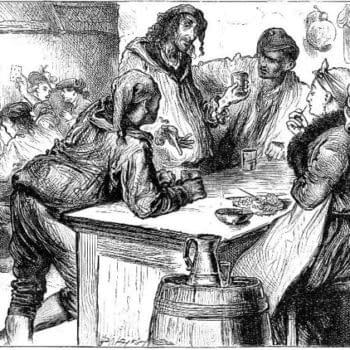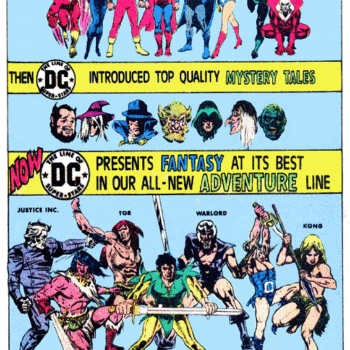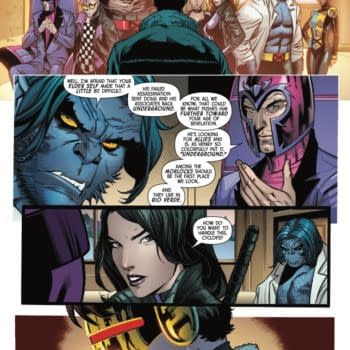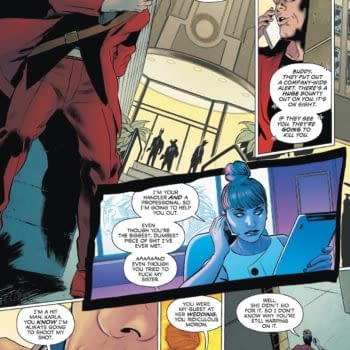Posted in: Comics | Tagged: Comics, David m singer, deluxe comics, lodestone, thunder agents
David M Singer, Publisher of Deluxe Comics, Passes
I received word from David M. Singer's wife that David passed away on Saturday, August 24 from Parkinson's disease. He was 56 years old.
I can imagine many comic book readers being unfamiliar with David M. Singer and his place in comic book history. That's because Singer's standing in the comic book industry essentially lasted only three years; in 1984, Singer began publishing "Deluxe Comics" with grandiose plans (and significant Wall Street funding), but by late 1986, he was driven out of the industry, never to be heard from again.
Singer's rise and fall were both caused by the T.H.U.N.D.E.R. Agents, that group of super-heroic, gadget-enhanced United Nation operatives that were created by Wally Wood and first published by Tower Comics in 1965 (and most recently licensed for publication by IDW). The gory details about Singer's T.H.U.N.D.E.R. Agents are too numerous for this article, but the "nutshell" version goes like this: John Carbonaro, who was acquainted with Singer, bought the rights to the T-Agents in 1981. Carbonaro made a deal with Archie Comics where he would pay for the production and packaging of a new T-Agents comic book that Archie would print and distribute. But because of Carbonaro's lack of funds and Archie's lack of interest in a new T.H.U.N.D.E.R. Agents comic book (Archie seemed more interested in reprinting the Wally Wood 1960s material), little came of the Carbonaro/Archie Comics effort.
Fast forward to 1983 when 26 year old David Singer, both a lawyer and a veteran fan press writer, saw an opportunity that he couldn't let pass by. Singer believed the Direct Sales comic book market (which had expanded greatly in just a few years) could be sufficiently tapped to allow a new comic book publisher to compete with the likes of DC and Marvel. But the only way to succeed, from Singer's perspective, was to make an immediate "big splash" which meant not only prying fan-favorite talent away from DC and Marvel, but also publishing a property that fans would recognize. Getting the talent was the easy part: after securing funding from Wall Street investors, Singer began offering page rates that were double (and sometimes triple) what DC and Marvel were offering its writers and artists.
And the property that Singer wanted his DC and Marvel transplants to work on was T.H.U.N.D.E.R. Agents. But didn't John Carbonaro own the exclusive rights to that property? Not according to Singer who argued that the T-Agents were in public domain because Tower Comics had failed to print the appropriate copyright notices in its issues when they were first published in the late 1960s. Singer's prestige format T.H.U.N.D.E.R. Agents comic book (titled Wally Wood's T.H.U.N.D.E.R. Agents) went on sale in 1984 and featured the work of such established (and popular) professionals as George Perez, Keith Giffen, Dave Cockrum, and Steve Englehart. Using his T.H.U.N.D.E.R. Agents comic book as a springboard, Singer began publishing other creator-owned titles like Dave Cockrum's The Futurians and Keith Giffen's March Hare. He also wanted to publish a second T-Agents title. Again, Singer aspired to become a publisher that would eventually match DC and Marvel's market share, and he had the financial backing to give it a serious try.
But then Carbonaro sued Singer over the rights to the T.H.U.N.D.E.R. Agents. At first glance, this looked like David suing Goliath: Singer had money, and Carbonaro, from all accounts, didn't. But the key advantage that Carbonaro had over Singer was that he secured pro bono representation. Singer, on the other hand, had to pay for his lawyers. The litigation was played out over a few years and included several twists and turns. But that just meant that legal proceedings became protracted, and when legal proceedings become protracted, the side that is paying for its legal representation is in trouble. Sure enough, by 1986, Singer found himself without the necessary funds to continue paying his lawyers. The game was up, and Singer was forced to settle out-of-court and accept whatever terms Carbonaro forced on him. As one would expect, the terms weren't pretty for Singer: the T.H.U.N.D.E.R. Agents unequivocally belonged to Carbonaro, and Singer was forbidden to dispute that publicly. Adding insult to injury, the T.H.U.N.D.E.R. Agents stories that Singer published, those now belonged to Carbonaro as well. Singer didn't have any more money left to continue being a comic book publisher, so he walked away from the industry, never to be heard from again.
I first encountered David Singer in 2009. John Carbonaro had passed away on February 25, 2009, and Singer was logging on to various comic book messageboards and posting his version of the events that played out between 1984 and 1986. With Carbonaro deceased, Singer assumed he was released from the terms of their settlement, and he could now finally tell "his side of the story." Singer got in touch with me because I was researching material for my book about the 1980s comic book industry (part of TwoMorrows Publishing's American Comic Book Chronicles series). We had a three hour long interview over the phone during which Singer provided numerous details of what transpired between him and Carbonaro.
Then, a couple of weeks later, Singer called me to say that any and all material in our phone conversation couldn't be used in my book because he had been contacted by lawyers representing John Carbonaro's estate who told him in no uncertain terms that he was still bound by the 1986 settlement. (Singer also had to revisit every messageboard he posted on and request that his posts be removed.) Luckily for me, I was still able to narrate Carbonaro and Singer's dispute in my book by referencing various issues of The Comics Journal which had documented just about every aspect of Carbonaro's lawsuit as it unfolded.
From that point on, Singer would call me every few months to learn of my progress with the book. A cynic would claim that Singer was contacting me out of self-interest. After all, wasn't my book going to "set the record straight"? I can see why people would assume that, but it didn't take long for him to reveal that he had been suffering Parkinson's disease since before the age of 50. I'm guessing most people are familiar with the symptoms of Parkinson's via actor Michael J. Fox. Including Singer, I've now personally known three people who have had to endure that disease, and it's something I wouldn't wish on my worst enemy. It's completely debilitating. Once David (out of respect, I'm going to call him David from here on out) revealed his health situation to me, I began to understand that his semi-regular phone calls to me were helping him, at least temporarily, forget his physical woes. As he talked to me about his comic book publishing days, he was remembering his youth. Yes, he was recounting some very troubling legal times and he lost his lawsuit with John Carbonaro in a big, big way, but ultimately, he was very proud of what he produced as a comic book publisher. Even though it was all taken away from him, he still liked being reminded of the aspirations he once had, especially because he had them when he was young and healthy.
After my book was published, I sent David a copy, but I never learned what he thought of my account of his dispute with John Carbonaro. If he hoped that I was going to depict him as a matyr or a victim, then I can only assume that my book disappointed him as I strove not to paint anyone as a saint or a sinner or as a hero or a villain. My task was to document, not judge or editorialize. If readers decide to appreciate David for his efforts or if they decide to hold him in contempt, that is completely their prerogative. I have read testimony that David was in the right when he claimed T.H.U.N.D.E.R. Agents were in the public domain, and I have read testimony that David was trying to pull a fast one and that he got what he deserved. It will take someone with more legal expertise than me to untwist the copyright pretzel that is T.H.U.N.D.E.R. Agents.
Personally, I'm more focused on the fact that a human being is resting at peace, no longer having to contend with the daily sufferings that Parkinson's disease brings.
R.I.P., David M. Singer.
Keith Dallas is the editor for TwoMorrows Publishing's American Comic Book Chronicles series.


















